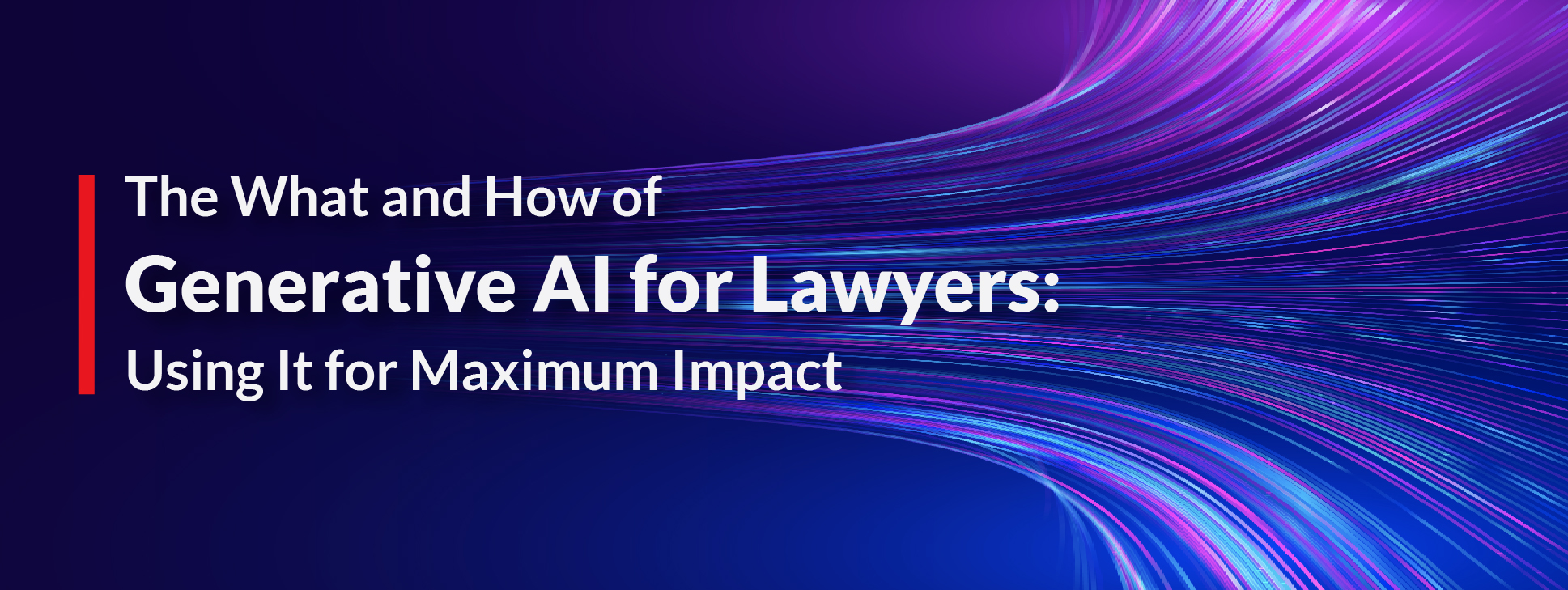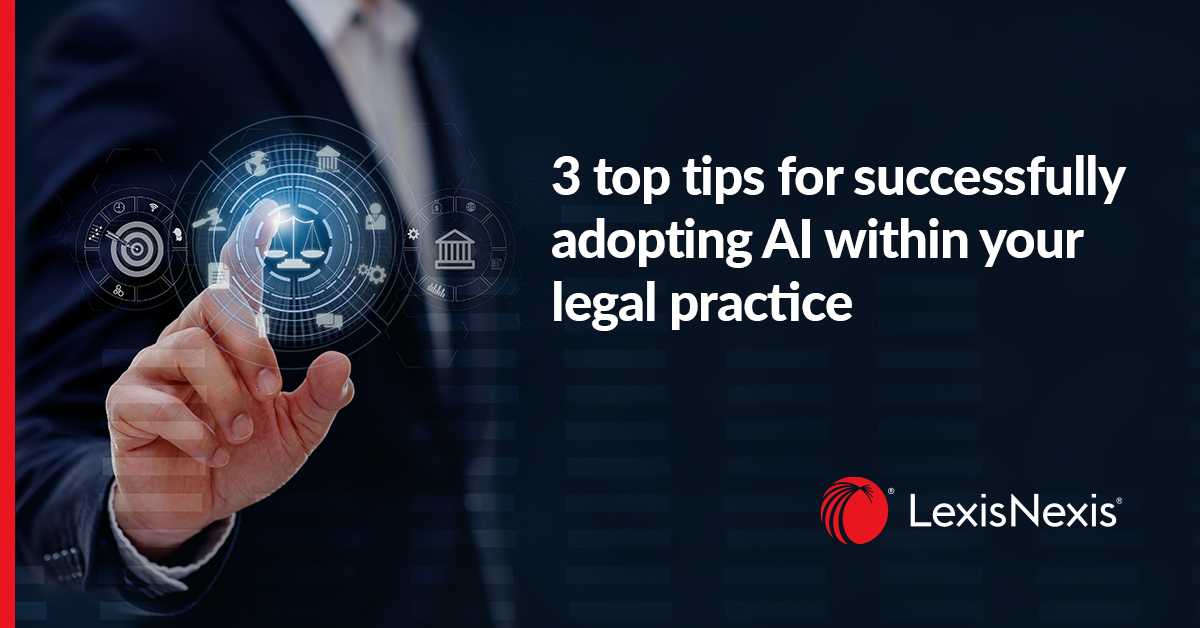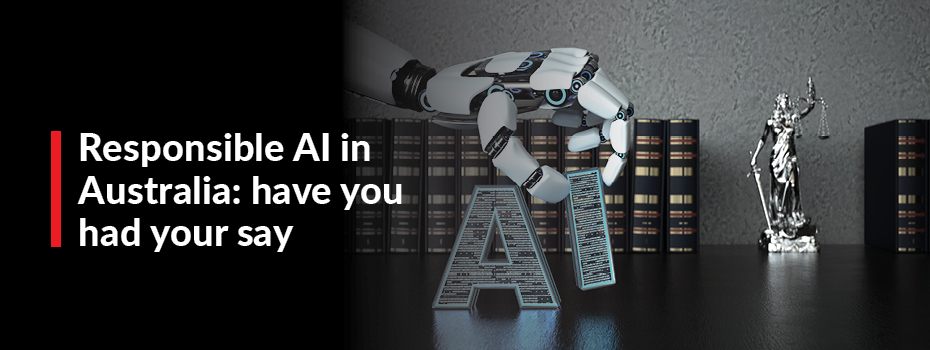
Generative AI for Lawyers: What It Is, How It Works, and Using It for Maximum Impact
06 June 2023 14:30
- What is Generative AI?
- Uses of Generative AI for Lawyers and Law Firms
- What to Look for When Selecting a Generative AI Tool
- Learn More about Generative AI Technology
In late November 2022, the release of ChatGPT, a powerful generative artificial intelligence (AI) tool, sparked a global revolution, with the legal industry also experiencing its profound effects. In fact, the legal industry has since reported more awareness than the general public of the increasing power of this technology, with 86% of lawyers reporting awareness of generative AI (vs. 57% of the public) and 51% of lawyers either currently using it or planning to use it (Based on a LexisNexis® survey completed in United States in March 2023).
This heightened awareness makes sense; after all, AI isn’t new to the legal industry. Research platforms like Lexis Advance®, Lexis® Argument Analyser and Lexis® Clause Intelligence have been incorporating AI technology into features like natural language search, data visualizations, and more for several years. However, the most recent developments in generative AI – that is, AI that can create information and mimic human conversation – are promising (or threatening, depending on your perspective) to completely revolutionize the industry.
The good news? Tools that use generative AI technology like GPT (Generative Pre-Trained Transformer) models offer unprecedented time-saving benefits, such as:
- Conversational search that can better understand what you’re trying to find and consider conversation history
- Summarizing capabilities that allow for quick, easy digestion of a legal topic
- Document drafting that provides first drafts of legal briefs, memos, emails, demand letters, basic contracts, and more
So, what's the verdict? Should lawyers use generative AI? And if so, how?
This article aims to help you answer those questions by diving into generative AI and its uses for law firms, as well as what lawyers should look for when selecting an AI-powered tool. It’s challenging to know how to respond to something new if you don’t fully understand it, so let’s start with the basics.
What is Generative AI?
Generative AI is a type of artificial intelligence that is capable of creating new content based on patterns and data it has learned from existing content.
So, how does it work? Generative AI builds upon extractive AI technology – that is, AI that locates relevant information – and uses machine learning algorithms to analyze patterns in large datasets, such as text or images. The AI then uses these patterns to create new content that is similar in style and structure to the original data but is entirely new and original.
- Looking for the definitions of “machine learning” and other AI-related terms? Check out AI Terms for Legal Professionals: Understanding What Powers Legal Tech
We’ll talk in greater depth about how lawyers can use this technology in a way that’s specific to the legal profession, but first, we’ll clarify the difference between GPT and Generative AI.
GPT and Generative AI
Many people became aware of generative AI through ChatGPT, which is named after the AI model it uses – but “generative AI” (GAI) and “GPT” aren’t necessarily interchangeable.
GPT stands “Generative Pre-Trained Transformer” and was developed by OpenAI as a type of generative AI called a “Large Language Model” (LLM) that specifically focuses on generating human-like language. Tools that use LLMs are pre-trained on massive amounts of text data, and then fine-tuned for specific language tasks, such as text completion or translation.
GPT models use a technique called a Transformer, which allows the model to analyze the context of the text it is generating and to generate language that is coherent and consistent with the context. As we’ll discuss later, ChatGPT itself should be used with caution – but other tools contain similar technology that allow users to generate new content without privacy risks.
Evolution to GPT-4
Although ChatGPT was released in late 2022, the first iteration of GPT technology was released in June 2018. The technology continued to improve, adding new parameters (i.e., information that contributes to the overall model’s “knowledge”) with each new version. GPT-1 operates off 117 million parameters; while this may seem like a large number, GPT-3 operates off 175 billion parameters. GPT-4, the most recent version (as of 2023), operates off trillions of parameters.
Generally speaking, the more parameters, the better the model – or, at least, the more advanced its knowledge. However, it’s important to note that as models get more complex, they can also run into complications. For example, they may run slower or require more resources to train to ensure they don’t produce “hallucinations” (i.e., confidently deliver false information) – just another reason to ensure you’re making an informed decision about a generative AI tool to use.
Uses of Generative AI for Lawyers and Law Firms
So far, we’ve covered the technical details of generative AI, but why should lawyers care about this at all? Ultimately, there’s no denying the benefits generative AI can pose to your daily work life. Imagine being able to automate your most tedious tasks, leaving more time for your most important tasks – like building strong client relationships, developing innovative legal strategies, and staying up to date on the latest legal trends. Plus, there’s no denying the competitive advantage it will give you over lawyers who are stuck in the past.
Keep reading to find out how generative AI can be incorporated into your daily workflows through research tools, drafting features, and business management help.
Legal Research Tools: Interact and Summarize
As mentioned, AI has been assisting lawyers with legal research for several years. However, through LLMs, generative AI offers the ability to engage in conversational search. Instead of using terms, connectors, and post-search filters, a conversational search tool mimics human interaction and can adjust results based on prompting and follow-up questions. Then, get the answer to your query summarized or use your search results to make predictions.
In short, LLMs can fundamentally improve your research process by:
- Identifying relevant case law and other legal documents without the use of Booleans
- Generating fast and digestible summaries of legal documents
- Predicting legal outcomes based on past cases
Legal Document Generation Tools
Did you know lawyers report spending most of their time at work drafting documents? There is a massive opportunity to save time by applying GPT technology to document drafting (and 53% of lawyers are already anticipating this*). With the help of a generative AI-powered tool, you could automate the drafting of:
- Contracts
- Legal briefs
- Patent applications, based on the specific needs of the user
A reliable tool can produce accurate first drafts with remarkable speed, allowing you to spend less time drafting and more time strategizing, building, and winning.
Chatbots and Virtual Assistants
How much time do you spend on maintaining the business of your firm? GPT can help via chatbots and virtual assistants that can perform tasks like:
- Answering basic legal questions
- Scheduling appointments
- Providing basic information about firm operations or legal services
These tools can be particularly useful for law firms and legal services providers that need to handle a large volume of inquiries from clients or for small law firms that are often tasked with running the business side of their firm while practicing law.
What to Look for When Selecting a Generative AI Tool for Your Law Firm
Already, GPT-powered tools are being introduced to the market. While it’s understandable to be excited about all that generative AI can do for you, it's unwise to choose just any AI-powered tool to assist you in your work. Most lawyers suspect it’s time to incorporate AI into their practice and are at least curious about generative AI – but the best lawyers will understand that it’s more important than ever to continue protecting client information and to use accurate information. To help with your decision, here are a few factors to consider when selecting a tool:
Accuracy and Reliability
The accuracy and reliability of the GPT tool are critical factors to consider, particularly when it comes to generating legal documents or conducting legal research. You should look for tools that have a high degree of accuracy and have been tested and validated by experts in the field. Some questions you might ask about both the tool and the company selling the tool include:
- Where is the tool getting its information?
— You should choose a tool that “learns” from a vetted database of citable authority that has updated and current information.
- How does the company approach artificial intelligence?
— The company should prioritize transparency and the removal of bias, inaccuracies, and harmful disinformation.
- What kind of experience does the company have with artificial intelligence?
— You should select a tool produced by a company with an existing track record of producing high-quality AI-powered products.
“ 1. We consider the real-world impact of our solutions on people 2. We take action to prevent the creation or reinforcement of unfair bias 3. We can explain how our solutions work 4. We create accountability through human oversight 5. We respect privacy and champion robust data governance”
— RELX Artificial Intelligence Principles
Data Privacy and Security
The importance of data privacy and security cannot be overstated – especially within the legal industry, where documents and client information are highly sensitive and confidential. You should ensure the tool you are using has robust data privacy and security measures in place.
While there are multiple drawbacks to using a free and/or open-source GPT tool (like ChatGPT), this is perhaps one of the most notable issues. An open-source tool does not protect your information or your client’s. Trustworthy generative AI-powered tools will be backed by organizations with strong and transparent views on data governance that the appropriate steps to uphold these standards.
Customisation
Different legal practices and specialties may require different types of language or specific legal terminology. Lawyers should look for tools that can be customized to their specific needs and can generate language that is appropriate for their practice.
For example, a tool with conversational search will allow you to adjust your tool’s outputs through prompts.
Ease of Use
Your selected tool should be easy to use and integrate into your existing workflows. Look for tools that have a user-friendly interface and can be easily integrated with other software and tools you are already using.
While at least a slight learning curve is to be expected with any new tool, the product should be designed with your beginning-to-end user experience in mind. Tools provided by companies with a solid track record of providing intuitive solutions and exceptional customer support are worth heavy consideration – which brings us to our final factor to consider.
Customer Support
As with any new tool, technical issues or questions may arise when using a GPT tool. Look for tools and companies that offer excellent customer support and resources, such as:
- Educational materials (webinars, Q&As, etc.)
- Opportunities to provide feedback
- 24/7 access to customer support
Learn More About Legal Generative AI Technology
AI is rapidly becoming an essential part of any winning law practice, with generative AI empowering attorneys to research and draft faster than ever before. Of course, adopting AI into your practice can feel daunting – but LexisNexis is here to support you.
In May 2023, LexisNexis US announced the launch of Lexis+ AI – a generative platform designed to transform legal work by helping you dramatically improve the speed, quality, and effectiveness of your practice. This tool brings together all of the critical features we discussed – conversational search, document drafting, and summarizing – while upholding robust accuracy and confidentiality standards.
Latest Articles
-
 Reducing the amount of unbillable time spent on case law research is a great reason for a barrister or law firm to invest in technology. But investing in AI is only one piece of the puzzle. The key to success is adoption.
Reducing the amount of unbillable time spent on case law research is a great reason for a barrister or law firm to invest in technology. But investing in AI is only one piece of the puzzle. The key to success is adoption. -
 Gayann Walkers is a well-respected Victorian Barrister. Tis interview focuses on what it takes to be a Barrister in sports law, and what the future of the field looks like.
Gayann Walkers is a well-respected Victorian Barrister. Tis interview focuses on what it takes to be a Barrister in sports law, and what the future of the field looks like. -
 The growth of artificial intelligence technologies in Australia has recently come under the spotlight, as the Albanese Government looks to review existing regulatory and governance mechanisms and establish applicable safeguards that are fit for purpose in the current day and age.
The growth of artificial intelligence technologies in Australia has recently come under the spotlight, as the Albanese Government looks to review existing regulatory and governance mechanisms and establish applicable safeguards that are fit for purpose in the current day and age.
Artificial Intelligence
LexisNexis has incorporated Al-powered solutions to unlock efficiency in your legal research and workflow for decades.
LEARN MORE LexisNexis
LexisNexis